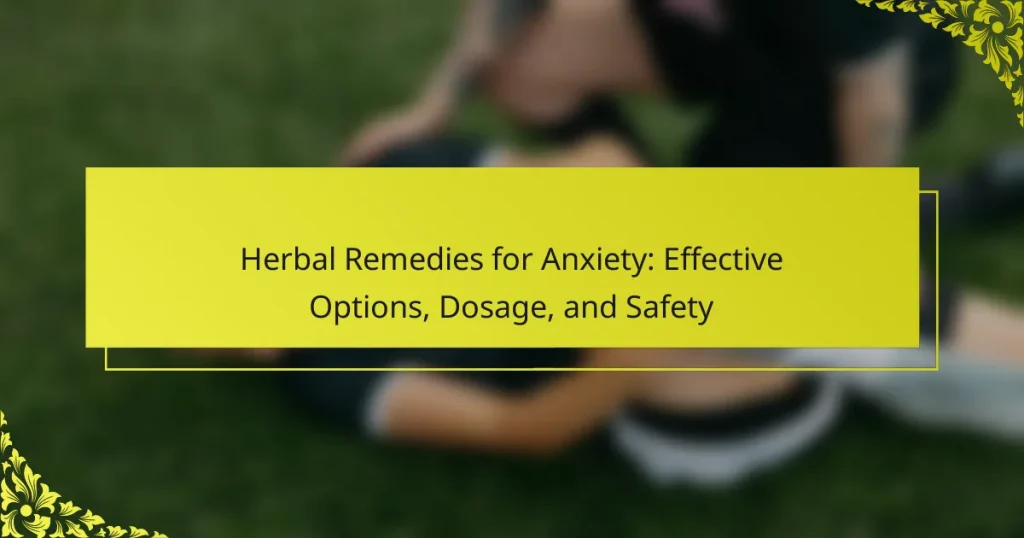Herbal remedies for anxiety offer natural solutions to manage stress and promote relaxation. This article explores effective options like chamomile, lavender, and valerian root, along with recommended dosages and safety considerations. Understanding the unique attributes and potential side effects of each remedy will help you make informed choices. Always consult a healthcare professional before starting any herbal treatment.
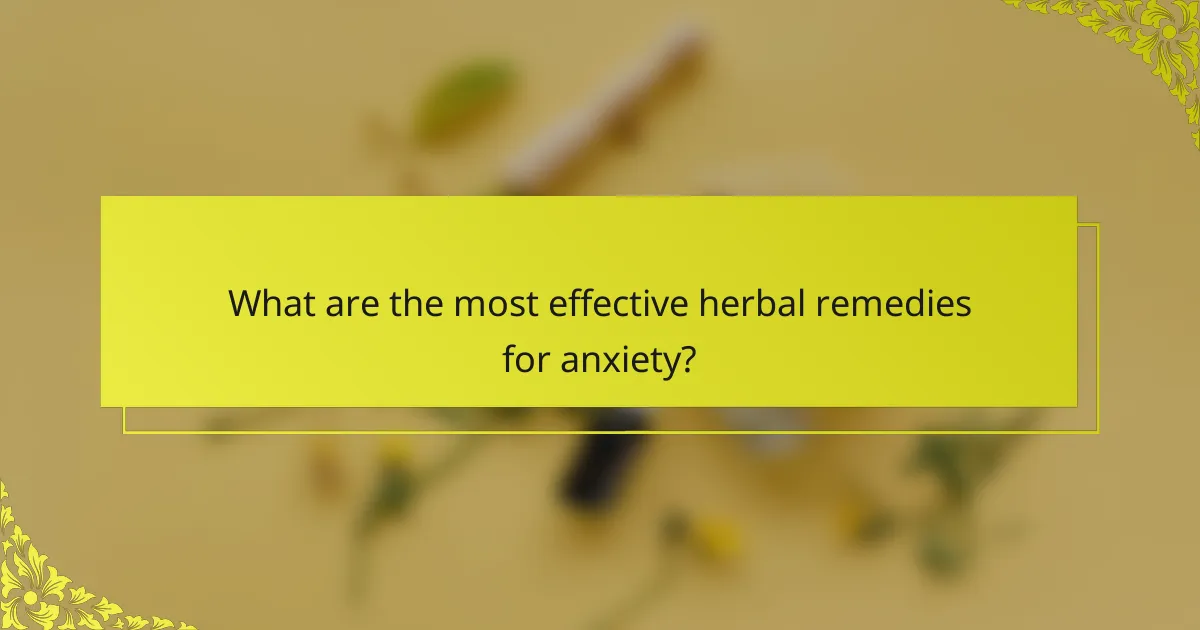
What are the most effective herbal remedies for anxiety?
Herbal remedies for anxiety include chamomile, lavender, and valerian root. These options have calming effects and are well-researched for their efficacy. Chamomile has anti-anxiety properties and can be consumed as tea. Lavender, often used in aromatherapy, promotes relaxation and reduces stress. Valerian root is known for its sedative effects, aiding sleep and anxiety relief. Dosage varies; chamomile tea typically requires 1-2 teaspoons of dried flowers per cup, while lavender oil may be used in diffusers or topical applications. Valerian root supplements often recommend 300-600 mg before bedtime. Always consult a healthcare provider for safety and appropriate use.
How does chamomile help alleviate anxiety?
Chamomile effectively alleviates anxiety by promoting relaxation and reducing stress. Its active compounds, such as apigenin, bind to brain receptors, leading to calming effects. Studies show that chamomile can significantly lower anxiety levels, making it a popular herbal remedy. Recommended dosage typically ranges from 200 to 400 mg of chamomile extract daily, ensuring safety and efficacy.
What role does valerian root play in anxiety relief?
Valerian root is effective for anxiety relief due to its calming properties. It contains compounds that enhance gamma-aminobutyric acid (GABA) levels, promoting relaxation. Studies indicate that valerian root can reduce anxiety symptoms and improve sleep quality. Recommended dosages typically range from 300 to 600 mg, taken before bedtime. Safety profiles suggest it is well-tolerated, though some may experience mild side effects like dizziness or digestive upset.
Can ashwagandha reduce anxiety symptoms?
Yes, ashwagandha can reduce anxiety symptoms. Research indicates that ashwagandha may lower cortisol levels and improve overall stress resilience. A study found that participants experienced a significant reduction in anxiety after taking ashwagandha extract for eight weeks. The typical dosage ranges from 300 to 600 mg per day, often taken in capsule form. Safety profiles suggest it is well-tolerated, though some individuals may experience mild side effects like gastrointestinal discomfort.
What is the impact of lavender on anxiety levels?
Lavender significantly reduces anxiety levels through its calming effects. Studies indicate that inhaling lavender essential oil can lower stress and anxiety, improving overall mood. Its unique attribute lies in its ability to promote relaxation without sedation. Dosage varies, but 2-3 drops of essential oil in a diffuser or diluted in a carrier oil is common for effective use. Safety is generally high, but individuals should consult healthcare providers if pregnant or nursing.
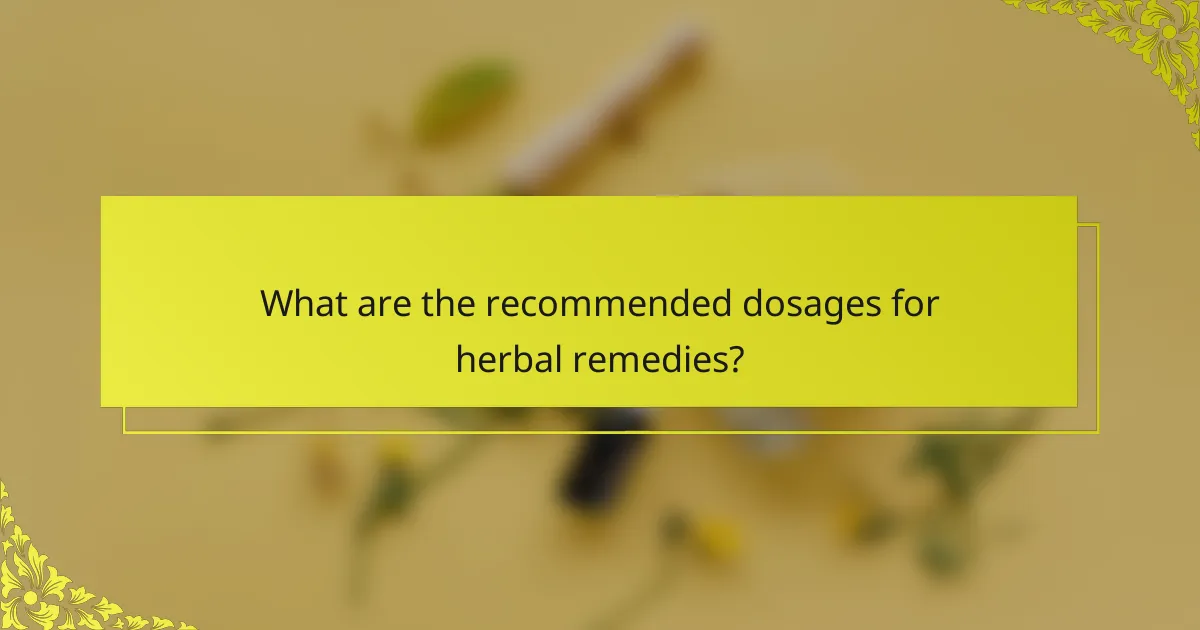
What are the recommended dosages for herbal remedies?
The recommended dosages for herbal remedies vary based on the specific herb and individual needs. For example, chamomile is often suggested at 400-1600 mg daily, while valerian root may range from 300-600 mg before bedtime. Always consult a healthcare professional for personalized advice.
What dosage of chamomile is considered safe?
The safe dosage of chamomile for adults typically ranges from 400 to 1600 mg per day. This dosage can be divided into several intakes throughout the day. For specific forms, such as chamomile tea, 1 to 2 cups per day is common. Individual responses may vary based on unique health conditions or medications. Always consult a healthcare professional before starting any herbal remedy.
How much valerian root should be taken for anxiety?
For anxiety, a typical dosage of valerian root ranges from 300 to 600 mg, taken 30 minutes to two hours before bedtime. This herbal remedy is known for its calming effects, making it a popular choice for managing anxiety symptoms. However, individual responses may vary, and it is advisable to consult with a healthcare professional before starting any new supplement.
What is the suggested dosage of ashwagandha for anxiety relief?
The suggested dosage of ashwagandha for anxiety relief typically ranges from 300 mg to 600 mg per day. This dosage can vary based on individual needs and the specific formulation of the supplement. Research indicates that ashwagandha may help reduce stress and anxiety levels effectively when taken consistently. Always consult a healthcare professional before starting any new supplement regimen.
How often should lavender be used for optimal effects?
Lavender should be used daily for optimal effects, typically in doses of 2 to 4 drops of essential oil or 1 to 2 cups of tea. Regular use helps maintain its calming benefits and reduces anxiety symptoms effectively. For best results, consider incorporating lavender into your routine through aromatherapy, topical application, or herbal tea.
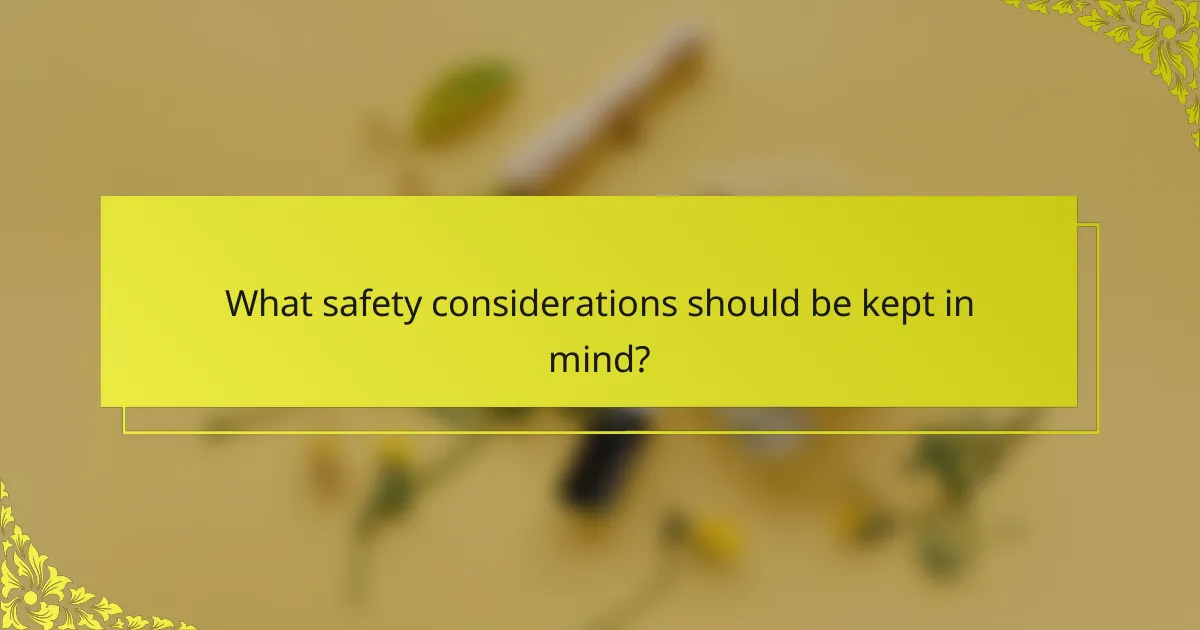
What safety considerations should be kept in mind?
When considering herbal remedies for anxiety, safety is paramount. Always consult a healthcare professional before starting any herbal treatment. Monitor for potential side effects, such as interactions with medications. Start with lower doses to assess tolerance. Pregnant or nursing individuals should avoid certain herbs. Keep in mind the unique attributes of each remedy, as some may have rare side effects.
Are there any side effects of chamomile?
Chamomile may cause mild side effects such as drowsiness, nausea, or allergic reactions. Rarely, it can interact with medications like blood thinners. Always consult a healthcare provider before use, especially if pregnant or nursing.
What precautions should be taken with valerian root?
Valerian root requires several precautions to ensure safe use. Consult a healthcare professional before starting, especially if pregnant or nursing. Avoid combining it with alcohol or sedatives due to increased drowsiness. Monitor for side effects like headaches or digestive issues, which can occur in some users. Limit use to short durations to prevent dependency.
Is ashwagandha safe for everyone?
Ashwagandha is generally safe for most people, but individual reactions may vary. Pregnant or breastfeeding women, individuals with autoimmune diseases, and those on specific medications should consult a healthcare professional before use. This herb can interact with certain medications, such as sedatives and thyroid hormone treatments. Always consider personal health conditions and consult a doctor for tailored advice.
What interactions might lavender have with other medications?
Lavender may interact with medications such as sedatives, antidepressants, and anticoagulants. These interactions can enhance sedation or affect blood clotting. Always consult a healthcare provider before combining lavender with other treatments.
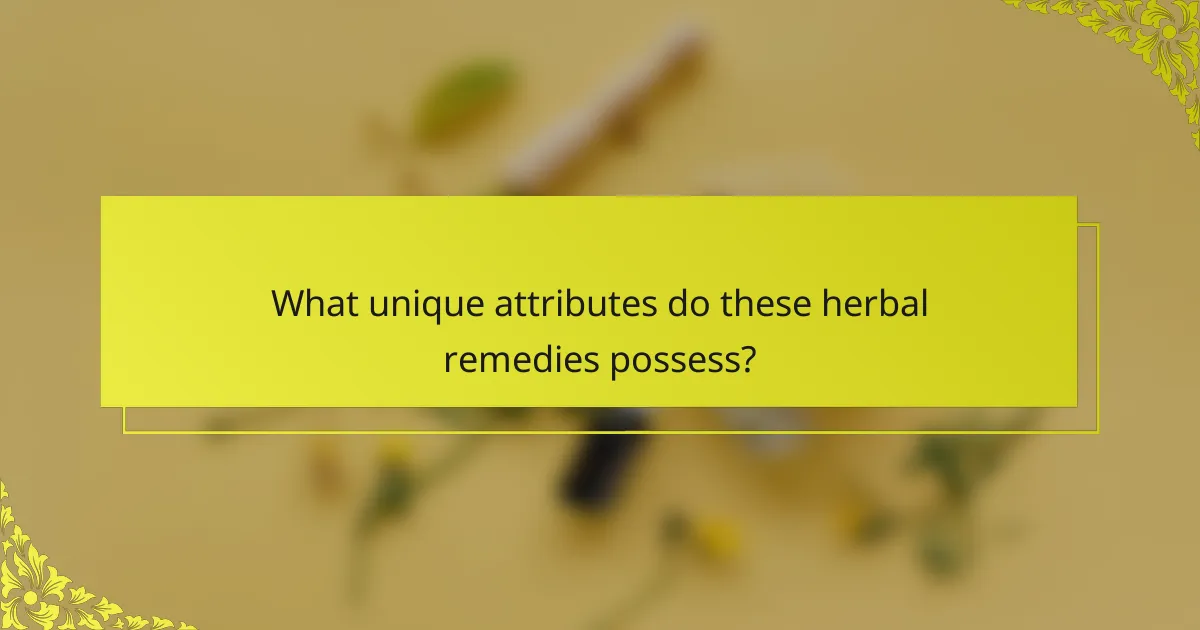
What unique attributes do these herbal remedies possess?
Herbal remedies for anxiety possess unique attributes that enhance their effectiveness. For example, ashwagandha is known for its adaptogenic properties, helping the body manage stress. Lavender oil’s unique fragrance can promote relaxation and improve sleep quality. Valerian root contains compounds that may reduce the time it takes to fall asleep, contributing to anxiety relief. Chamomile is recognized for its calming effects, which can alleviate symptoms of anxiety. These unique attributes make each remedy suitable for different aspects of anxiety management.
How does the calming effect of chamomile differ from other remedies?
Chamomile offers a unique calming effect compared to other herbal remedies due to its distinct compounds. Unlike valerian root, which acts as a sedative, chamomile promotes relaxation without drowsiness. Its primary active ingredient, apigenin, binds to brain receptors, providing anxiety relief and enhancing sleep quality. In contrast, other remedies like lavender may primarily reduce stress through aromatherapy rather than direct ingestion. Chamomile is generally safe for most people, with a typical dosage of 400-1600 mg per day.
What makes valerian root unique in its mechanism of action?
Valerian root’s unique mechanism of action involves modulation of gamma-aminobutyric acid (GABA) receptors, promoting relaxation and reducing anxiety. Its active compounds, such as valerenic acid, enhance GABA’s calming effects, differentiating it from other herbal remedies. This unique attribute contributes to valerian root’s effectiveness as a natural treatment for anxiety, offering a distinct approach compared to conventional medications.
What distinguishes ashwagandha from other adaptogens?
Ashwagandha is distinguished from other adaptogens by its unique ability to lower cortisol levels while enhancing stamina and strength. Unlike many adaptogens, it specifically targets stress reduction and anxiety relief. Ashwagandha’s root contains withanolides, which are compounds that contribute to its distinct effects on the body. This herbal remedy is also noted for its rare attribute of promoting overall well-being by supporting cognitive function and immune health, making it a versatile choice among herbal remedies for anxiety.
How does the aroma of lavender contribute to its effectiveness?
The aroma of lavender enhances its effectiveness by promoting relaxation and reducing anxiety. Its scent triggers the brain’s limbic system, which influences emotions. Studies show that inhaling lavender can lower heart rate and blood pressure, contributing to a calming effect. This unique attribute makes lavender a popular choice in herbal remedies for anxiety.

What rare attributes are associated with these remedies?
Rare attributes associated with herbal remedies for anxiety include specific plant compounds that exhibit unique calming effects, such as the presence of flavonoids in chamomile. Another rare attribute is the synergistic effect of combining multiple herbs, which can enhance overall efficacy. Additionally, some remedies may have unique preparation methods, like cold infusion, that influence their potency. These attributes contribute to the individualized effectiveness of each remedy.
What is the historical significance of chamomile in anxiety treatment?
Chamomile has historically been significant in anxiety treatment due to its calming properties. Ancient Egyptians used chamomile for its soothing effects, while Greek and Roman cultures recognized its ability to reduce stress. Research supports chamomile’s efficacy, showing potential in lowering anxiety levels. Its unique attribute lies in its natural compounds, such as apigenin, which bind to brain receptors, promoting relaxation. Over centuries, chamomile remains a popular herbal remedy, highlighting its enduring relevance in anxiety management.
Are there any uncommon benefits of valerian root?
Valerian root offers several uncommon benefits beyond its well-known use for anxiety. It may enhance sleep quality by promoting deeper sleep cycles, which can improve overall restfulness. Additionally, valerian root has been linked to reduced menstrual discomfort, providing relief for some women during their cycles. Its potential to improve cognitive function, particularly in stress-related scenarios, is another rare attribute that makes it noteworthy. Lastly, valerian root may possess antioxidant properties, contributing to overall health by combating oxidative stress.
What unique preparations of ashwagandha exist for anxiety?
Unique preparations of ashwagandha for anxiety include capsules, powders, tinctures, and teas. Capsules offer convenience and precise dosing. Powders can be mixed into smoothies or foods, providing flexibility in intake. Tinctures deliver rapid absorption through liquid form. Teas offer a soothing experience, enhancing relaxation. Each preparation varies in potency and onset time, catering to individual preferences and needs.
How does lavender’s use in aromatherapy differ from its ingestion?
Lavender’s use in aromatherapy primarily involves inhalation, promoting relaxation, while ingestion focuses on direct health benefits. Aromatherapy harnesses lavender’s calming scent to alleviate anxiety, whereas ingestion may provide digestive support and other therapeutic effects. Aromatherapy typically requires essential oil, while ingestion can involve teas or capsules. Proper dosage and safety guidelines differ significantly between these methods, emphasizing the need for caution in consumption.
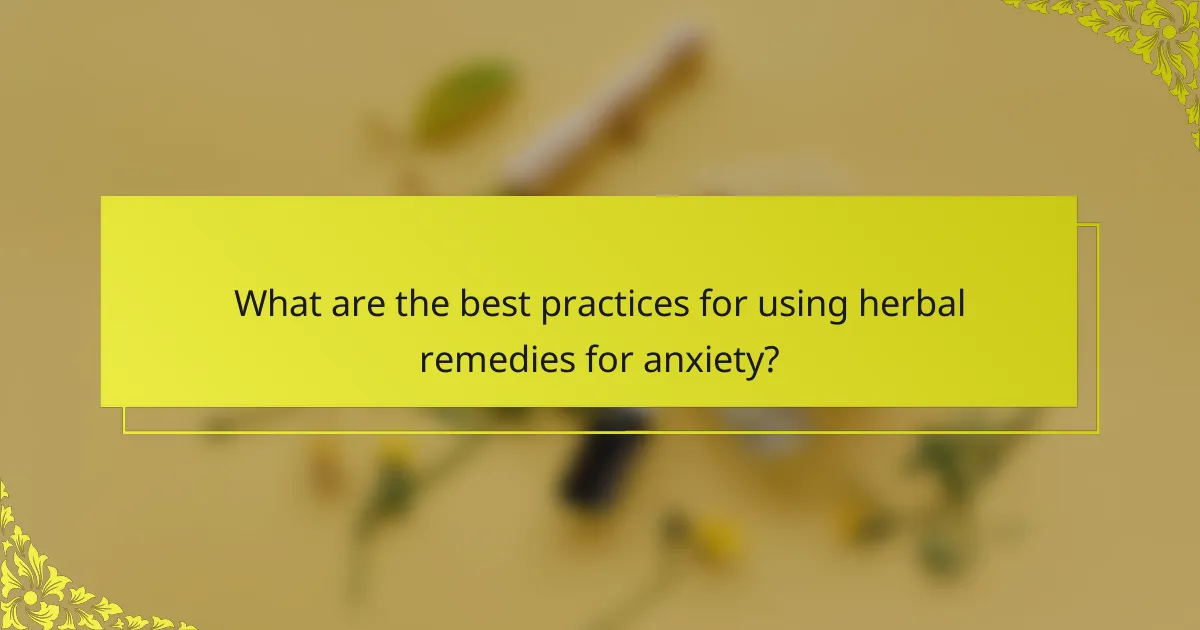
What are the best practices for using herbal remedies for anxiety?
Herbal remedies for anxiety include options like chamomile, valerian root, and lavender, which can be effective when used correctly. Dosage varies, but typically ranges from 300 mg to 600 mg for most herbal supplements. Safety is crucial; consult a healthcare professional before starting any new remedy to avoid interactions with medications and ensure proper use.
How can one combine herbal remedies for enhanced effects?
Combining herbal remedies can enhance their effects for anxiety relief. To achieve this, consider synergistic combinations like chamomile with lavender or valerian with passionflower. These pairings may amplify calming effects while maintaining safety. Always consult a healthcare professional for appropriate dosages and potential interactions.
What common mistakes should be avoided when using these remedies?
Common mistakes to avoid when using herbal remedies for anxiety include incorrect dosage, neglecting potential interactions with medications, and overlooking individual sensitivities. Many users underestimate the importance of consulting a healthcare professional before starting any herbal regimen. Additionally, relying solely on herbal remedies without incorporating other therapeutic approaches can limit effectiveness. It’s crucial to research each remedy’s unique attributes and potential side effects to ensure safety and efficacy.
What expert tips can help optimize the use of herbal remedies for anxiety?
To optimize the use of herbal remedies for anxiety, consider the following expert tips. Start with proper identification of effective herbs like chamomile and valerian root. Dosage is crucial; follow guidelines or consult a healthcare professional. Monitor individual responses to avoid adverse effects. Additionally, ensure quality by sourcing from reputable suppliers. Incorporate these remedies into a holistic approach that includes lifestyle changes, such as stress management techniques and regular exercise.
